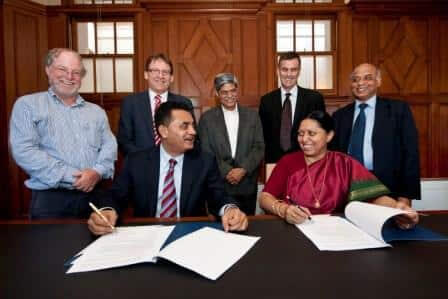Ind-Aus pact will target maternal mortality in India, writes USHA ARVIND

Low in cost and plentifully available, the humble banana could well become the biggest weapon in India ’s battle against micronutrient deficiency over the next decade. India is the world’s largest producer of bananas, all of which are consumed locally.
Packed with high levels of sucrose, fructose and glucose which give both instant and sustained boosts of energy, bananas are a powerhouse of micro-nutrients as well, making it a complete food and valued as much by elite athletes as the common man.
High in potassium, bananas stimulate the brain and prevent stroke and blood pressure, as well as having anti-cancer properties. The fruit aids absorption of calcium. Full of fibre, it prevents constipation, acidity and heartburn. It is also loaded with B vitamins that calm the nerves and trigger production of mood enhancing serotonin.
A high level delegation from India ’s Department of Biotechnology recently inked a pact with Queensland University of Technology (QUT) to cultivate a new strain of banana for the domestic market that would be high in iron levels as well. The bio-fortified banana, developed by a team led by Prof. James Dale (AO), Director of the Centre for Tropical Crops and Biocommodities at QUT, will address iron deficiency anaemia, which currently causes a high level of mortality in India , particularly among pregnant mothers.
The deal, signed by QUT Vice Chancellor Peter Coaldrake and Dr Renu Swarup of the Department of Biotechnology (DoB), is the first of its kind for the Indian government in the agriculture sector, and has generated a high level of anticipation and optimism in the country.
“Iron deficiency is a huge problem for all developing countries, associated with low nutrition, not just vegetarianism. So the project will obviously have far reaching long-term benefits for us,” Dr Renu Swarup stated.
Prof. Dale will head the project along with Dr Rakesh Tuli, the scientific programme coordinator for India .
“Bananas are a common component of the Indian diet, thus making it an ideal vehicle to increase iron intake,” Prof Dale told Indian Link.
“Our short-term objectives are to demonstrate that we can increase iron intake to a level that will have a significant effect. The long-term objective, of course, is to have a very significant impact on reducing iron deficiency anemia in India ,” the international biotechnology expert, who specializes in tropical crops, added.
“While we are not targetting malnutrition as such, we certainly hope to correct micronutrient deficiencies, which are prevalent in many developing country populations, including India ,” he clarified.
The latest Indian chapter is an extension of the $5 million Far North Queensland programme funded by the Bill & Melinda Gates Foundation. The parent project (Grand Challenges in Global Health) kicked off back in 2005 to develop a strain of nutrient dense bananas high in both iron and beta-carotene, specifically for East Africa .
“Most developing countries in Africa and indeed worldwide, have high levels of micronutrient deficiencies and these are now rated in the top three or four public health problems in the world, with HIV/AIDS and malaria the top two,” Dale explained.
“In Uganda for instance, where we are currently working, around 30% of children under 5 and women of child bearing age have vitamin A deficiency and this number shoots up to nearly 80% for iron deficiency anemia. These numbers don’t vary enormously between developing countries and there are probably similar numbers in India . These levels are despite the interventions of food fortification and supplements. This is essentially a ‘resistant population’ and it is this population we are targetting,” he added.
The watershed deal stems from a visit to QUT by a delegation from India ’s Department of Biotechnology a couple of years ago.
“I presented the outcomes of the Africa project and there was immediate interest from the Indian side,” Dale explained. “Since then we have negotiated with DBT regarding the scope of the project culminating in the agreement last week. The project will be primarily funded through DBT with QUT contributing some in-kind contribution”.
The first phase of the project, spanning four years, will involve the major technology transfer component. QUT scientists will develop the technique to generate Australian bananas to be rich in iron and then transfer this technology to India , so that Indian scientists can generate an Indian banana cultivation rich in iron, while training Indian scientists in all aspects of this development.
Based on the timelines in Africa , Prof. Dale expects the bananas to then become available to Indian farmers in about 10 years.
However, an issue of concern in food fortification projects is absorption. Bioavailability as it is scientifically known, is a very important consideration, admitted Dale. “Just because a food contains a particular nutrient doesn’t mean that nutrient will be available to the ‘consumer’. Part of the project therefore, will also be to assess the bioavailability of iron in banana fruit. Results using a non-feeding model suggest that the bioavailability will be good, but the final result depends on feeding trials”.
Likewise, another thorny issue is the negative perception of genetically modified foods. “In the case of bio-fortified bananas, we are only increasing the levels of products naturally found in the fruit and not introducing new products,” Dale argued.
“This project is directed towards improving health in poor rural families. We believe these points will significantly lessen opposition. Also, these bananas will not be marketed for at least another decade. I fully expect that the current attitudes will be very different in that timeframe,” he concluded optimistically.




